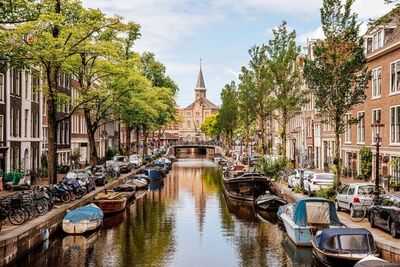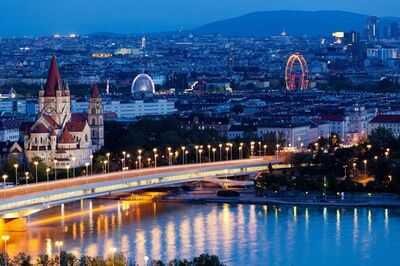When Brits are looking for a short getaway that doesn't cost the earth, the instinct is often to cast their eyes just across the Channel. Mainland Europe has long been the default escape for those after a change of scenery without venturing too far, whether that means a weekend of culture, good food, or simply somewhere new to wander.
A new survey of 1,676 travellers - conducted by Which? - has now put those instincts into numbers, ranking 39 cities across the continent based on accommodation, food and drink, cultural attractions, ease of getting around, shopping, crowds, and overall value for money.
From Ireland to Turkey, the results reveal which destinations are capturing the imagination of British travellers - and which are falling short.
At the very bottom of the list, Cologne and Dublin tied for 39th place with just 69 per cent. Just above them, Brussels and Amsterdam also occupied the lower end of the rankings, highlighting how some famous European capitals struggle to impress in comparison with smaller or less visited cities.

Milan and Dubrovnik followed, with Bologna, Riga, and Oslo just above, showing that even attractive destinations can fall behind in a survey where affordability, ease of getting around, and crowding matter to visitors.
Athens, Munich, Lisbon, Copenhagen, Ghent, and Bruges occupied the middle range, offering a mixture of historical and cultural attractions. Barcelona, Valletta, and Malaga were highlighted for their appeal to those after sun-soaked breaks, while Bergen and Stockholm represented northern Europe. Porto and Paris also appeared in this mid-tier bracket, alongside Madrid, Hamburg, Nice, and Funchal.
Italy continued to feature strongly, with Florence, Rome, and Verona all appearing in this group, drawing visitors for their rich history and cultural landmarks.
Entering the top ten, Budapest ranked tenth. The city is known for its thermal baths, the Hungarian Parliament building and a riverside setting along the Danube. Its chain bridges and panoramic river views are prominent features, and the mix of grand architecture and public spaces defines much of the central cityscape.
Berlin came ninth. The German capital is notable for its public transport network and a wide range of attractions, from World War II memorials and Museum Island to contemporary art galleries and an active nightlife scene. The city's scale and transport links make it easy to move between historic districts, shopping streets and quieter residential quarters.
Prague was eighth. The city's Old Town, cobbled streets, colourful façades and bridges create a compact historic core. Prague's layout - with lively central squares alongside quieter lanes - contributes to its reputation for well-preserved medieval and baroque architecture.
In seventh place, Bordeaux is characterised by its riverside quays along the Garonne and a long association with wine culture. The city centre features historic architecture, elegant public squares and tree-lined boulevards, alongside museums and culinary destinations linked to the region's viticultural heritage.
Seville ranked sixth. The city contains Moorish palaces such as the Alcázar and the Gothic cathedral, its streets host tapas bars and flamenco venues, and Seville's architectural and cultural mix reflects its Andalusian history.
Istanbul placed fifth, with an 88 per cent rating in the survey. The city scored five stars for food and drink and cultural sights, and four stars for accommodation, with an average hotel price reported at £68 a night. Istanbul spans Europe and Asia and is home to landmarks such as the Hagia Sophia, the Blue Mosque, major bazaars and scenic Bosphorus waterfronts.
Tied for joint third and fourth on 89 per cent were Vienna and Valencia. Vienna received five stars for food and drink, ease of getting around and cultural sights. The city is known for its palaces, coffee houses and concert halls, with walkable streets and an extensive public transport system.

Valencia earned five stars for food and drink and four stars for ease of getting around, with an average hotel cost reported at £106. Its cityscape mixes a medieval core and old markets with modern developments such as the City of Arts and Sciences.
Venice took second place with 90 per cent. The city received five stars for cultural sights and accommodation, while value for money scored two stars and crowds one star - average hotel prices were reported at £132 a night. Venice is defined by its canals, gondolas and historic palaces, and its geography and artistic heritage remain central to its appeal.
At the top, Krakow was ranked first with 92 per cent overall. It was the only destination to earn five stars for accommodation, food and drink, ease of getting around and value for money, with an average hotel stay reported at £86.
Krakow's UNESCO-listed Old Town and central Rynek Gówny square are focal points for the city, nearby sites such as Auschwitz and the Wieliczka Salt Mine are significant historical destinations, and seasonal events including Christmas markets feature in the city's year-round offer.
Full ranking of European cities:
You may also like

"GST reforms have harmed small businesses, reckless decisions": Cong MP Imran Masood

Popular DJ who 'lit up the room everywhere he played' dies leaving fans heartbroken

Travis Barker's daughter Alabama hits back at claims she shared miscarriage for attention

Jay Slater's mum Debbie recalls harrowing moment she called 999 to report him missing

"Bihar people support NDA, govt working for Viksit Bharat, Viksit Bihar": Goa CM Pramod Sawant






